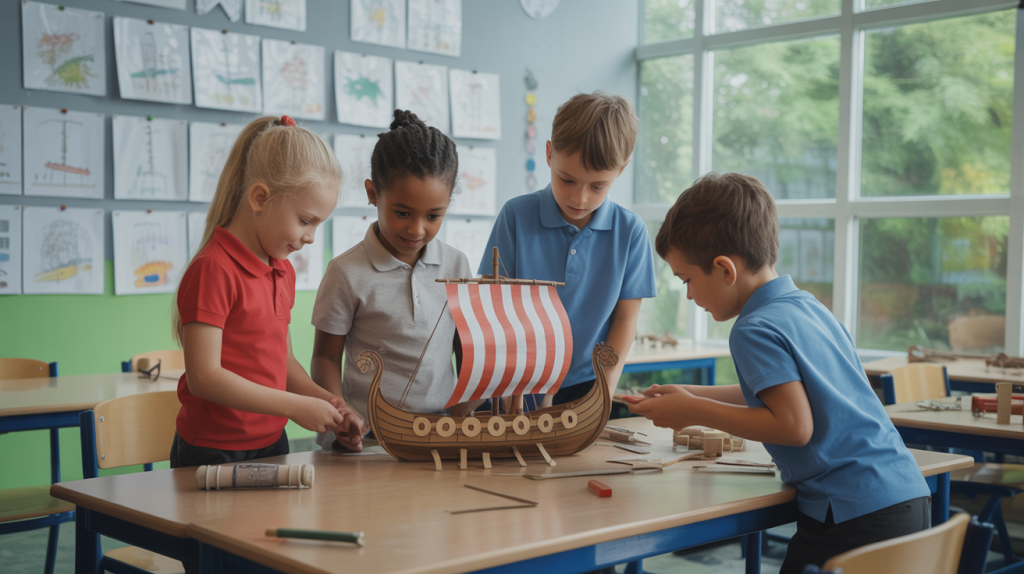A Guide to Denmark’s Most Innovative Educational Practices
Quick Navigation
- Promoting Creativity, Innovation, and Critical Thinking
- Integration with Industry and Real-World Experience
- Teamwork and Collaborative Learning
- Focus on Problem Solving and Open Debate
- Innovation in Curriculum and Teaching Methods
- Global and Interdisciplinary Approach
- Summary Table
- Conclusion
- Take the Next Step
Promoting Creativity, Innovation, and Critical Thinking
Denmark’s educational landscape is distinguished by its commitment to developing creativity and critical thinking skills. From an early age, students are encouraged to think outside the box and bring innovative solutions to real-world problems. This pedagogy is embedded in the educational system, ensuring that students are well-prepared for the challenges of a rapidly changing world.
- Emphasis on Analytical Skills: Danish education prioritizes analytical thinking alongside creative problem-solving, helping students navigate complex issues effectively.
- Tailored to All Levels: This approach is maintained throughout all levels of education, reinforcing the importance of innovative thinking.
Integration with Industry and Real-World Experience
The collaboration between Danish higher education institutions and industry partners sets a strong precedent for integrating theoretical knowledge with practical experience. By involving businesses, industries, and public research entities, Danish universities provide students with valuable access to the professional world.
- Internships: Students often have the opportunity to participate in credit-earning internships that offer hands-on experience and insights into various industries.
- Networking: Direct interactions with industry experts allow students to build networks that can greatly enhance their employability after graduation.
Teamwork and Collaborative Learning
In the Danish educational philosophy, teamwork is not merely encouraged; it is an essential component of learning. Students frequently engage in group work that extends beyond class projects to include final exams and theses.
- Skill Development: Collaborative learning helps develop essential social skills, fostering the ability to work effectively in team settings—an important skill in today’s job market.
- Peer Learning: Students learn from one another, gaining diverse perspectives and insights that enhance the educational experience.
Focus on Problem Solving and Open Debate
Denmark’s educational approach integrates traditional lectures with modern, problem-based learning methods, emphasizing open debate and discussion in the classroom.
- Engaged Learning Environment: Classrooms are designed to be relaxed spaces where students feel comfortable expressing opinions and challenging ideas.
- Critical Engagement: This cultivates a culture of inquiry, where learning is seen as a collaborative process rather than a one-sided dissemination of information.
Innovation in Curriculum and Teaching Methods
Danish educational reforms reflect a commitment to continuous innovation in teaching methodologies and curriculum development. The focus is on equipping students with skills relevant to modern demands.
- Interdisciplinary Approach: Innovative competencies are integrated across various subjects, ensuring that students can apply knowledge in diverse contexts.
- Flexible Learning: The curriculum is designed to adapt to the needs of students, preparing them for both local and global challenges.
Global and Interdisciplinary Approach
Danish higher education institutions actively participate in international partnerships, enhancing their students’ educational experiences.
- Global Collaborations: Institutions frequently collaborate with foreign universities, providing students with opportunities for exchange programs and collaborative research.
- Exposure to Diverse Ideas: This global perspective enriches the academic environment, fostering a broader understanding of various cultural and academic contexts.
Summary Table: Key Innovative Practices in Danish Education
| Practice | Description |
|---|---|
| Creativity & Critical Thinking | Emphasis on developing creativity and analytical skills from an early age |
| Industry Collaboration & Internships | Direct links to business and research, with credit-earning internships |
| Teamwork & Collaborative Learning | Group work emphasized for both coursework and final assessments |
| Problem Solving & Open Debate | Open classroom discussions and problem-based learning as core teaching methods |
| Innovation in Curriculum | Focus on innovative competences across all fields, especially after education reforms |
| Global & Interdisciplinary Connections | Partnerships with global institutions and interdisciplinary projects |
Conclusion
Denmark’s commitment to innovative educational practices positions it as a top destination for international students seeking a modern and relevant academic experience. With a focus on creativity, industry collaboration, teamwork, problem-solving, and global perspectives, Denmark offers a unique environment that prepares students not just for academic success, but also for real-world challenges.
For those involved in international student recruitment, university admissions, or educational agencies, the advantages of studying in Denmark are clear. With a strong focus on innovation and excellence, Danish education is designed to nurture the leaders of tomorrow.
Take the Next Step with Study in Denmark
Interested in exploring educational opportunities in Denmark? Connect with us to learn more about how we can help you thrive in Denmark’s exceptional educational landscape.



